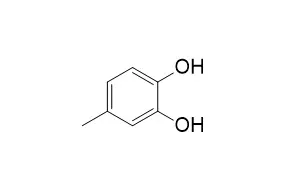| Cell Research: |
| J Pharmacol Exp Ther,2003 Jul;306(1):317-23. | | In vitro cytotoxicity of 4-methylcatechol in murine tumor cells: induction of apoptotic cell death by extracellular pro-oxidant action.[Pubmed: 12676882] | Assessment of the in vitro cytotoxicity has recently been become popular as a primary screening method for evaluating the antitumor activities of various chemicals and natural substances. For example, quercetin and related phenolic compounds, present in teas, wines, and other plant products, have been shown to cause their cytotoxic effects on tumor cells in culture, proposing their protective effects against the development of cancer. However, 4-Methylcatechol, a metabolite produced in the intestinal tract after ingestion, has been shown to cause the promotion rather than suppression of tumor in rat stomach despite its in vitro cytotoxic activity.
METHODS AND RESULTS:
To address the inconsistency between its in vivo and in vitro actions, the effect of 4-Methylcatechol on the viabilities of murine tumor cells was examined, and 4-Methylcatechol was shown to reduce their viabilities through the induction of apoptosis. In addition, since catechol compounds have been shown to have a complex mixture of pro-oxidant and antioxidant actions in the in vitro assay systems, the cytotoxic activity of 4-Methylcatechol was reassessed in the presence of either catalase or reduced-form glutathione, and both of them were shown to protect the cells against the damage induced by 4-Methylcatechol. Moreover, the generation of hydrogen peroxide was observed by incubating the drug in the growth medium with or without the cells.
CONCLUSIONS:
These findings indicate that, similar to other catechol compounds, 4-Methylcatechol may induce the apoptotic death of murine tumor cells through its extracellular pro-oxidant action on the cells. |
|
| Animal Research: |
| J Neurol Sci,1994 Mar;122(1):28-32. | | The therapeutic effects of 4-methylcatechol, a stimulator of endogenous nerve growth factor synthesis, on experimental diabetic neuropathy in rats.[Pubmed: 8195800] |
METHODS AND RESULTS:
We investigated therapeutic effects of 4-Methylcatechol (4-MC), a non-amine catechol compound, on streptozotocin (STZ)-induced diabetic neuropathy in rats. 4-MC is one of the potent stimulators of endogenous nerve growth factor (NGF) synthesis both in vitro and in vivo. Diabetic rats showed a statistically significant reduction in motor nerve conduction velocity (MNCV), mean myelinated axon diameter, and NGF content in the sciatic nerve during the experimental period of 8 weeks. The 4-MC treatment started 4 weeks after the STZ injection resulted in significantly greater NGF content, faster MNCV, and larger mean myelinated nerve fiber diameter and axon diameter than in untreated diabetic rats.
CONCLUSIONS:
These findings suggest that a decreased NGF level in the diabetic sciatic nerves may be involved in the pathogenesis of diabetic neuropathy and that 4-MC treatment could be useful for diabetic neuropathy. |
|






 Cell. 2018 Jan 11;172(1-2):249-261.e12. doi: 10.1016/j.cell.2017.12.019.IF=36.216(2019)
Cell. 2018 Jan 11;172(1-2):249-261.e12. doi: 10.1016/j.cell.2017.12.019.IF=36.216(2019) Cell Metab. 2020 Mar 3;31(3):534-548.e5. doi: 10.1016/j.cmet.2020.01.002.IF=22.415(2019)
Cell Metab. 2020 Mar 3;31(3):534-548.e5. doi: 10.1016/j.cmet.2020.01.002.IF=22.415(2019) Mol Cell. 2017 Nov 16;68(4):673-685.e6. doi: 10.1016/j.molcel.2017.10.022.IF=14.548(2019)
Mol Cell. 2017 Nov 16;68(4):673-685.e6. doi: 10.1016/j.molcel.2017.10.022.IF=14.548(2019)